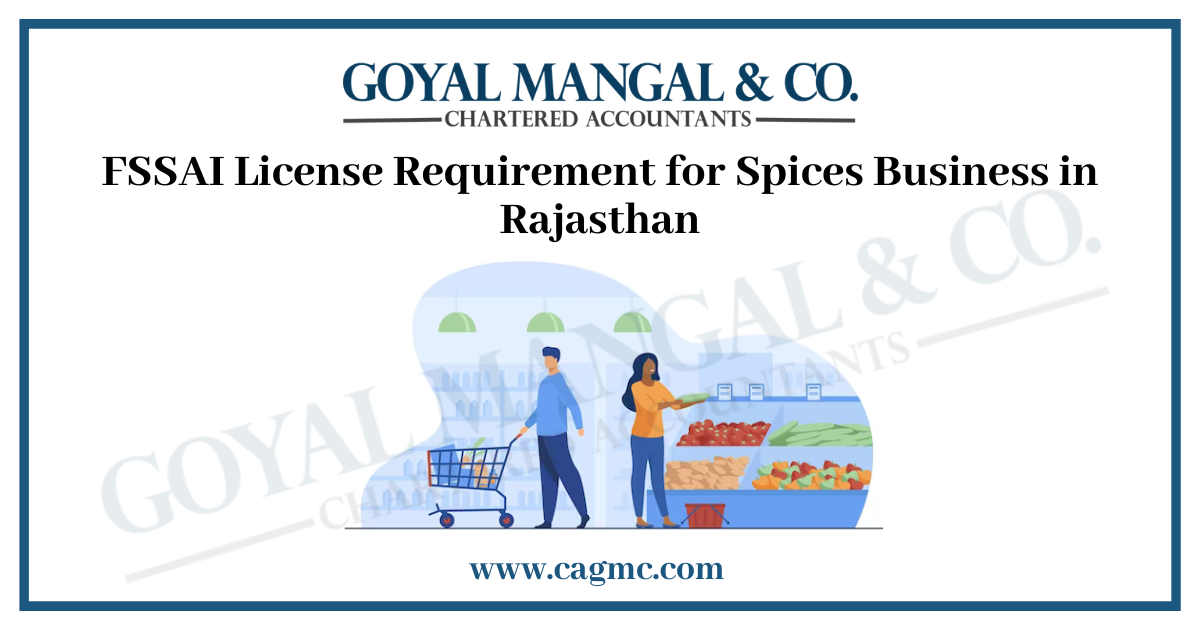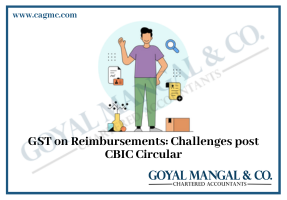
The FSSAI license is an important certification in India that makes sure food products are safe and of high quality. It plays a crucial role in protecting people’s taste buds and ensuring that food businesses follow strict rules. With this license, businesses have to meet specific guidelines, go through careful inspections, and meet high standards. It acts like a special ingredient that keeps consumers healthy and happy, knowing that their favorite foods have been prepared with great care and attention. Without this license, the culinary world would be chaotic and people wouldn’t have the same peace of mind about the food they eat. From street vendors to gourmet restaurants, FSSAI license has become a symbol of trust and reliability, making every bite a delectable adventure you can savor with confidence. This article describes the process to obtain FSSAI License for Spices Business in Rajasthan, State FSSAI License, Central FSSAI License.
|
Table of Content |
Introduction (Spices Business)
Operating a spices business in India (Rajasthan) requires adherence to various regulations and licensing requirements to ensure the safety and quality of the products being offered to consumers. The Food Safety and Standards Authority of India (FSSAI) is the governing body responsible for setting and enforcing food safety standards in the country. This article will outline the FSSAI license requirements for a spices business in Rajasthan.
Legal Obligation for Spice Manufacturer in Rajasthan
As a spice manufacturer in Rajasthan, the following legal obligations should be adhered to in accordance with Indian laws:
- FSSAI Compliance: Comply with the regulations set by the Food Safety and Standards Authority of India (FSSAI), including obtaining the necessary FSSAI license to ensure food safety and quality standards.
- Labelling Requirements: Ensure proper labelling of spice products with accurate information such as the common or botanical name, net quantity, date of manufacture, best before date, FSSAI logo, and license number, as mandated by the Food Safety and Standards (Packaging and Labelling) Regulations.
- Quality Standards: Maintain adherence to the quality standards specified by the FSSAI, including parameters related to extraneous matter, microbiological contaminants, pesticide residues, aflatoxin, and heavy metals, as mentioned in the Food Safety and Standards (Food Products Standards and Food Additives) Regulations.
- Compliance with Trade Laws: Fulfill trade-related obligations such as obtaining necessary trade licenses, adhering to regional business regulations, and complying with tax obligations under the Goods and Services Tax (GST) regime.
- Employment Laws: Comply with labor laws, including payment of minimum wages, providing a safe and healthy working environment, and adhering to regulations related to employee benefits and working hours.
Regulatory Guidelines Framed By FSSAI To Oversee The Quality Of Spice
The Food Safety and Standards Authority of India (FSSAI) oversees the quality of spices through regulatory guidelines established under the Food Safety and Standards Act, 2006. These guidelines include:
- Food Safety and Standards (Food Products Standards and Food Additives) Regulations, 2011: This regulation sets out the quality standards for various food products, including spices, specifying parameters for extraneous matter, microbiological contaminants, pesticide residues, aflatoxin, and heavy metals.
- Food Safety and Standards (Packaging and Labeling) Regulations, 2011: These regulations mandate proper labeling requirements for spices, including the provision of accurate information such as the common or botanical name, net quantity, batch number, date of manufacture, best before date, instructions for use, and the FSSAI logo and license number.
- Food Safety and Standards (Prohibition and Restrictions on Sales) Regulations, 2011: These regulations aim to prevent the adulteration of food products, including spices, by prohibiting the use of certain substances or specifying maximum permissible limits for contaminants and additives.
- Food Safety and Standards (Contaminants, Toxins, and Residues) Regulations, 2011: These regulations establish maximum permissible limits for various contaminants, toxins, and pesticide residues in food products, including spices, to ensure consumer safety.
Reasons to start a spice business in Rajasthan.
- Rich culinary heritage and demand for flavorful spices.
- Abundance of diverse spices grown in Rajasthan.
- Potential to cater to the local market and tourism sector.
- Export opportunities for authentic Rajasthani spices.
- Government support and incentives for small businesses.
- Growing trend of health-conscious consumers seeking organic spices.
- Favorable climate and fertile soil for spice cultivation.
- Opportunity to contribute to the promotion of Rajasthani cuisine.
- Access to a skilled workforce for spice processing and packaging.
- Potential for collaboration with local farmers and spice suppliers.
Costing required for starting a spice business in Rajasthan.
The costing required for starting a spice business in Rajasthan can vary depending on the scale and specific requirements of the business. However, as a rough estimate, here are some key cost considerations which are required apart from FSSAI license fee:
- Procurement of raw materials/spices from local farmers or wholesale markets.
- Setting up a processing unit, including equipment and machinery for cleaning, grinding, and packaging.
- Costs associated with obtaining necessary licenses and certifications.
- Packaging materials, including containers, labels, and branding.
- Marketing and promotion expenses to create brand awareness and reach the target market.
- Labor costs for skilled and unskilled workers.
- Transportation and logistics costs for sourcing raw materials and distributing finished products.
- Utilities and infrastructure expenses for the processing unit.
FSSAI License for Spices Business in Rajasthan
- Basic FSSAI Registration:
- All food businesses, including spices businesses, with an annual turnover of up to Rs. 12 lakhs, are required to obtain a basic FSSAI registration.
- The application for basic registration must be made to the Food and Drug Administration (FDA) or the designated officer in the respective district of Rajasthan.
- Basic FSSAI registration involves the submission of basic details about the business and a nominal fee.
- State FSSAI License:
- Spices businesses with an annual turnover of more than Rs. 12 lakhs and up to Rs. 20 crores are required to obtain a state FSSAI license.
- The application for a state license must be submitted to the FDA or designated officer within the state of Rajasthan.
- Along with basic details, additional documents such as identity proof, address proof, and food safety management plan need to be provided.
- The state FSSAI license is valid for a period of 1 to 5 years, depending on the preference of the business owner.
- Central FSSAI License:
- Spices businesses with an annual turnover exceeding Rs. 20 crores are required to acquire a central FSSAI license.
- The application for a central license must be submitted directly to the FSSAI headquarters in New Delhi or through the online portal.
- The central FSSAI license requires detailed information about the business, including infrastructure, processing units, storage facilities, and more.
- Additionally, supporting documents such as product testing reports, NOC from local authorities, and an affidavit of compliance must be provided.
- The central FSSAI license is valid for a period of 1 to 5 years, depending on the preference of the business owner.
List of Licenses required for Spices Business
- Business Registration: Business registration refers to the process of formally establishing a business entity with the relevant government authority. It involves obtaining a unique identification number or registration certificate, which legally recognizes the existence of the business.
- FSSAI License: The Food Safety and Standards Authority of India (FSSAI) license is mandatory for any food business, including spice manufacturers, distributors, and retailers, to ensure compliance with food safety and quality standards. It certifies that the spices meet the necessary requirements and are safe for consumption.
- GST Certificate: The Goods and Services Tax (GST) certificate is necessary for businesses in India with an annual turnover above a certain threshold. It enables the collection and remittance of GST, a unified tax on the supply of goods and services, which is applicable to spice businesses as well.
- Trade License (Regional): A trade license, also known as a business license, is typically issued by local or regional authorities. It authorizes businesses to operate in a specific jurisdiction and ensures compliance with local regulations, such as zoning laws, health and safety standards, and business operation guidelines.
- Udyog Aadhaar MSME Registration: Micro, Small, and Medium Enterprises (MSMEs) in India can obtain Udyog Aadhaar MSME registration. This registration provides various benefits and incentives to spice businesses, such as priority lending, subsidies, and assistance from government schemes designed to promote and support MSMEs.
- AGMARK Certification: AGMARK is a quality certification provided by the Agricultural and Processed Food Products Export Development Authority (APEDA) in India. It ensures that spices meet specific quality standards, including parameters related to purity, hygiene, and labeling. AGMARK certification adds credibility to the spices and enhances their market value.
Procedure for Applying FSSAI License for Spices Business in Rajasthan or How to apply for FSSAI License
These are the following procedure which one needs to follow while applying for FSSAI License for Spices Business in Rajasthan:
- Determine the Type of License: Identify the annual turnover of your spices business to determine the type of FSSAI license required. If the turnover is up to Rs. 12 lakhs, a basic registration is sufficient. For turnovers between Rs. 12 lakhs and Rs. 20 crores, a state FSSAI license is needed. If the turnover exceeds Rs. 20 crores, a central FSSAI license is mandatory.
- Gather Required Documents: Collect the necessary documents for the FSSAI license application. These may include:
- Identity Proof (Copy of the proprietor/partners/directors’ Aadhaar card or any other government-issued identity document.)
- Address Proof (Copy of the proprietor/partners/directors’ electricity bill, water bill, or any other address proof document.)
- Photographs (Passport-sized photographs of the proprietor/partners/directors.)
- Proof of Business Entity (Copy of the partnership deed, certificate of incorporation, or any other document proving the existence of the business entity.)
- Food Safety Management System Plan (Document outlining the food safety management system implemented by the business, such as HACCP plan, standard operating procedures (SOPs), and relevant documentation.)
- List of Food Products (Comprehensive list of food products to be manufactured, processed, packaged, or sold, including the specific category and sub-category of each product.)
- Layout Plan of the Premises (Detailed layout plan of the premises where the food business activities will take place, including dimensions, location of different sections, and facilities for storage, production, and sanitation.)
- Equipment List (Inventory of equipment and machinery used for food processing, packaging, and storage, along with their specifications and capacity.)
- Water Test Report (Recent water test report from a recognized laboratory confirming the suitability of the water used in the food processing activities.)
- Certificate of Analysis (Laboratory test reports for food products conducted by an accredited laboratory to ensure compliance with quality and safety standards.)
- Declaration Form (Duly filled and signed declaration form provided by the FSSAI.)
- Affidavit (Affidavit stating that the information provided in the application is true and correct, signed by the proprietor/partners/directors.)
- Fill the Application Form: Fill out the FSSAI license application form online or offline, depending on the mode provided by the FSSAI. The application form should be completed accurately, providing all the required details about your spices business.
- Submit the Application: Submit the completed application form along with the necessary documents to the Food and Drug Administration (FDA) or the designated officer in your respective district of Rajasthan.
- Application Review and Inspection: After submitting the application, the FDA or designated officer will review the documents and conduct an inspection of the premises. This inspection is carried out to ensure compliance with food safety standards and the suitability of the facilities for spice processing and storage.
- Fee Payment: Pay the applicable fee for the FSSAI license. The fee amount varies depending on the type of license and the duration selected (1 to 5 years). The fee can be paid online or offline, as per the guidelines provided by the FSSAI. The FSSAI license fee for one year varies based on the type of food business and annual turnover.
- License Issuance: Once the application is approved, and the necessary inspections are completed, the FSSAI license will be issued. The license should be prominently exhibited at the business premises.
- License Renewal: It is important to renew the FSSAI license and pay the FSSAI license cost before it expires to ensure the continuity of your spices business. Keep track of the license expiration date and follow the renewal procedure as per the guidelines provided by the FSSAI.
Conclusion
Obtaining an FSSAI license for your spices business in Rajasthan is not just a legal requirement but a crucial step towards ensuring the safety and quality of your products. The FSSI license serves as a badge of trust, assuring consumers that your spices meet the highest standards of hygiene and quality. By diligently following the application procedure, submitting the required documents, and complying with food safety regulations, you not only demonstrate your commitment to consumer well-being but also gain a competitive edge in the market. The FSSAI license not only opens doors to new opportunities but also instills confidence among your customers, leading to increased credibility and loyalty. Remember, with the right licensing and adherence to FSSAI guidelines, your spices business in Rajasthan can thrive, offering aromatic and flavorful delights while prioritizing the health and satisfaction of your valued customers. So, embark on this exciting journey towards obtaining an FSSAI license and watch your spices business flourish in the vibrant land of Rajasthan.







